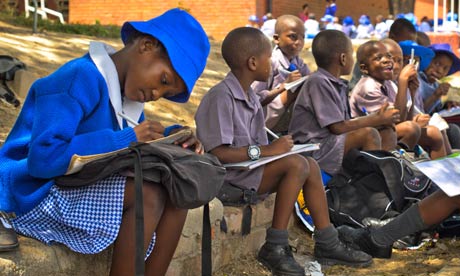
Rising numbers of children are no longer attending class at Mupinga Primary School in the southeastern Zimbabwean district of Chiredzi. They’re too hungry to study.
Bloomberg
Enrollment at the school this year is down by at least 150 students, more than a 10th of the school total, Maxwell Macheke, the headmaster, said in an interview. Last week teachers had to scrape money together and rush out to buy a bag of cornmeal, a staple food, to feed one particularly distressed student, he said.
“Some of the children walk 10 kilometers (6 miles) to come to school every day,” Macheke said. “We’ve noticed that some of them no longer bring their lunch boxes.”

The worst drought in a decade has left Zimbabwe, once Africa’s second-biggest corn exporter, with a 700,000 metric ton deficit of the grain, about two-thirds of the southern African nation’s annual consumption. With the economy half the size it was in 2000, Zimbabweans are increasingly depending on international relief agencies to feed them. Aid groups expect the El Nino weather phenomenon to reduce crops further north in Mashonaland Central and West areas later this year.
In Southern Africa El Nino usually causes droughts while increasing rains in the east of the continent.
“Chiredzi is one of the most affected areas by drought in the country,” said Tinashe Mubaira, a spokesman for the United Nations World Food Programme, which is providing aid to 1.5 million people in Zimbabwe. “This is 163 percent more than last year.”
- Chamisa under fire over US$120K donation
- Mavhunga puts DeMbare into Chibuku quarterfinals
- Pension funds bet on Cabora Bassa oilfields
- Councils defy govt fire tender directive
Keep Reading
The food situation in Mupinga, about 527 kilometers southeast of the capital, Harare, is so dire that it’s classified as a “red zone” where even livestock is threatened, said Simplisio Mavenga, a social welfare officer.
About a 10th of the 5,651 people in Mupinga are receiving food aid at the moment, and some villagers complained that the ration had been cut to 6 kilograms (13 pounds) of sorghum from 10 kilograms.
“In Africa, there are many countries in need of food aid, that’s why the rations have been reduced,” Titus Mafemba, the national food aid coordinator in Zimbabwe for Plan International, explained to people waiting for food on Tuesday. “We realize that there are many people in need of food assistance, but half a loaf is better than nothing.”
As Natsai Muyenga, a 36-year-old mother of two, received her monthly ration of sorghum, peas and cooking oil, she explained that she will have to share it with her husband, mother and mother-in-law.
“Adults will have to skip meals in between so that children get to eat,” she said. “Some have not been fortunate and it means they will be borrowing from those who got something. Everyone knows the pain of going to sleep with an empty stomach, so we share the little that is there.”










